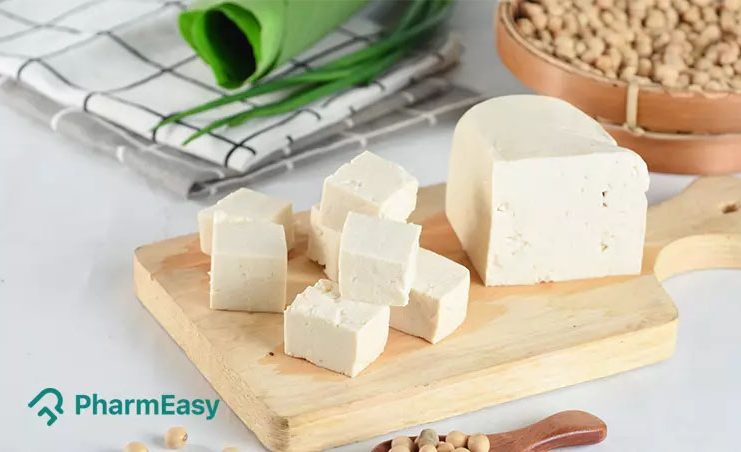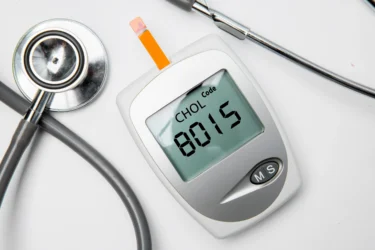Tofu: Uses, Benefits, Side Effects By Dr. Smita Barode
By Dr Smita Barode +2 more

Get,

to manage your symptom
Get your,


4 Cr+ families
benefitted

OTP sent to 9988776655



You’ve successfully subscribed to receive
doctor-approved tips on
Whatsapp

Get ready to feel your best.

Hi There,
Download the PharmEasy App now!!


Register to Avail the Offer
Send OTPBy continuing, you agree with our Privacy Policy and Terms and Conditions

Hi There,
Sign up on PharmEasy now!!
Trusted by 4 crore+ families

OTP sent to 9988776655



You have unlocked 25% off on medicines




Code: NU25
By Dr Smita Barode +2 more
Table of Contents
Animal products are the best source of protein and if you are trying protein from a vegetarian source, then tofu is the best alternative. Tofu is soybean curd produced by curdling fresh soymilk. Soy curd is pressed into smooth-textured, cheese-like solid blocks referred to as Soy cheese. If you cannot eat dairy products and are lactose intolerant, you may try this tofu1,3. Tofu has two thousand years history old and first originated in China. King Lui An of the Han dynasty developed tofu for the first time and it became versatile food in eastern Asia1,2. Tofu is called by various names like Okabe or Shirakabe in Japan, Doufu in China, Tahu in Indonesia, Tobu in Korea, and Tau fu in Malaysia2. Tofu is a rich source of polyunsaturated fatty acids and cholesterol free3. Let’s discuss the health benefits of Tofu that might help you plan a healthy meal for your kids and family.
Tofu contains plant-based protein, with cholesterol-free and is packed with polyunsaturated fats. 100 grams of Tofu provides 144 Kcal of total energy3,4. The nutritional value of Tofu is described below:

The beneficial properties of Tofu may include the following:
Did you know tofu is one of the best sources of plant-based protein? A study showed that in the making and processing of tofu, lesser impact on the environment was seen as compared to meat. So, considering tofu might also be good for the environment8.
Dr. Siddharth Gupta, B.A.M.S, M.D (Ayu)
Tofu may be considered a superfood from a nutrition and health point of view1. The following are the potential uses of Tofu.

Tofu may lower the blood sugar level and it may due to the presence of proteins. The proteins may increase the production of insulin hormone in the body and might lower blood sugar levels1. However, Diabetes is a serious condition, and we advise you to take medical consultations and not use tofu to self-medicate.

Tofu may contain isoflavones and saponins, which might increase blood flow by reducing blood cholesterol levels and removing the bile acids. It may also help to reduce blood vessel inflammation and increase their elasticity. Hence, it might limit the risk of stroke and other heart diseases1. However, more research on humans is required. If you have heart issues, please consult your doctor and do not self-medicate.

Tofu may contain antioxidants which may help in destroying free radicles. Deactivating these free radicles with antioxidants may help in reducing oxidative stress in the body. Hence, you may eat Tofu and its antioxidant properties might repair liver damage5. However, this study is insufficient as it is conducted on animals. Therefore, speak with your doctors and only have it if recommended. Do not self-medicate.

Tofu may contain minerals like iron, magnesium, copper, zinc, and selenium. It may also contain phytoestrogen which looks like estrogen (female hormone), and it may help in reducing the risk of breast cancer1,6. However, further research is to be needed to claim all these benefits of tofu. If you have cancer problems consult your doctor and do not self-medicate.

Tofu is inexpensive, serves as a high-quality protein and is packed with vitamins, antioxidants, and minerals. Tofu is easily digestible, has no saturated fats, and is cholesterol-free. So, adding Tofu to your meal might help you to manage weight1,5.

Though studies show the benefits of Tofu in various conditions, these are insufficient, and there is a need for further studies to develop the true scope of the benefits of Tofu on human health. In addition, each person may respond differently to these herbs. Therefore, it is crucial to consult a physician before using Tofu for any medical condition.
In Western cooking, tofu is now being pushed as a meat substitute due to its high protein content and low calories. Tofu is also gaining popularity in vegetarian and vegan diets across the world9.
Dr. Rajeev Singh, BAMS
There are three types of Tofu. Soft and medium soft Tofu are eaten fresh, whereas firm Tofu is grilled, fried, steamed or fermented into processed food2.
Tofu is a popular ingredient in Thai and Chinese cuisine. However, some people complain about its bland taste. Here, we bring a few delicious suggestions for preparing Tofu6.
People must take advice from an Ayurvedic physician before including Tofu in their daily diet. Further, we recommend not to replace or discontinue any ongoing treatment of modern medicine with any ayurvedic or herbal preparations of Tofu without taking the medical advice of a doctor. They will guide you with its form and dosage per your health condition.
Studies show that Tofu is safe to eat. However, people with a history of soy allergies may be affected by side effects7. So, if you are allergic to soy products, look out for the following symptoms:
Soy products may also have the following side effects if consumed in large amounts:
However, if you observe any allergic reaction, immediately rush to the hospital and contact your doctors to get the proper treatment for your allergies.
Tofu, when eaten in moderation, is safe. However, general precautions must be followed.
Also Read: Peanut Butter: Uses, Benefits, Side Effects By Dr. Rajeev Singh
No significant studies relate the interactions between Tofu and other drugs. However, you should not presume that there are no interactions at all.
Hence, take advice from Ayurvedic doctors and they will direct you to a better way to have Tofu as an herb.
Also Read: Turnip: Uses, Benefits, Side Effects By Dr. Rajeev Singh
Tofu is called Soybean curd. It is prepared by curdling fresh hot soymilk with coagulants to form a curd, which is then pressed into soft cheese-like food. It is densely packed with plant protein used as a meat alternative1,2.
Tofu has three types: soft, medium-soft, and firm Tofu. The soft Tofu is not pressed and eaten as it is. Medium soft Tofu is used for everyday cooking. And firm Tofu is dried, grilled, fried, and fermented into processed food2.
The essential vitamins in Tofu include vitamins C, A, B1, B5, B2, B3 and B94.
The significant disadvantages of Tofu may cause allergies in some people. The symptoms of soy allergies include skin rash, inflammation, itching, fainting, breathing difficulty, abdominal pain and throat swelling. In rare scenarios, Tofu may cause osteoporosis and estrogen-related cancer1,7.
Tofu might have blood sugar-lowering properties as tofu contains proteins and it may help in reduce diabetes1. However, diseases like Diabetes require proper diagnosis and treatments; therefore, consult a qualified physician before having Tofu.
1. Eze N, Okwume U, Eseadi C, Udenta E, Onyeke N, Ugwu E, et al. Acceptability and consumption of Tofu as a meat alternative among secondary school boarders in Enugu State, Nigeria. Medicine. 2018;97(45(e13155)):1–7. Available from: https://www.ncbi.nlm.nih.gov/pmc/articles/PMC6250531/pdf/medi-97-e13155.pdf
2. T Ono. Soy (Soya) Cheeses. In: Benjamin Caballero, editor. Encyclop of Food Sci and Nutri. Second Edition. ScienceDirect: Academic Press; 2003. p. 5398–402. Available from: https://www.sciencedirect.com/science/article/pii/B012227055X011135
3. Cleveland Clinic. 5 Reasons To Eat More Tofu [Internet]. Cleveland (OH): Cleveland Clinic; 2023 Sep 14 [cited 2026 Jan 7]. Available from: https://health.clevelandclinic.org/tofu-benefits
4. Food Data Central. Tofu, raw, firm, prepared with calcium sulfate. [Internet]. U.S. Department of Agriculture. 2019 [cited 2022 Sep 21]. Available from: https://fdc.nal.usda.gov/fdc-app.html#/food-details/172475/nutrients
5. Yakubu N, Oboh G, Olalekan A. Antioxidant and Hepatoprotective Properties of Tofu (Curdle Soymilk) against Acetaminophen-Induced Liver Damage in Rats. Biotech Res Interna. 2013;2013(230142):1–7. Available from: https://downloads.hindawi.com/archive/2013/230142.pdf
6. Health benefits of Tofu – MSU Extension [Internet]. [cited 2022 Sep 21]. Available from: https://www.canr.msu.edu/news/health_benefits_of_tofu
7. Soy Allergy: Symptoms, Treatments & Tests [Internet]. [cited 2022 Sep 21]. Available from: https://my.clevelandclinic.org/health/diseases/11320-soy-allergy
8. Scherer L, Rueda O, Smetana S. Chapter 14 – Environmental impacts of meat and meat replacements. In: Meiselman HL, Lorenzo JM, editors. Meat and Meat Replacements: An Interdisciplinary Assessment of Current Status and Future Directions. Woodhead Publishing; 2022. p. 365-397. doi:10.1016/B978-0-323-85838-0.00012-2. Available from:https://www.sciencedirect.com/science/chapter/edited-volume/abs/pii/B9780323858380000122
9. ScienceDirect Topics. Soy Product [Internet]. Elsevier; [cited 2026 Jan 7]. Available from: https://www.sciencedirect.com/topics/agricultural-and-biological-sciences/soy-product
Disclaimer: The information provided here is for educational/awareness purposes only and is not intended to be a substitute for medical treatment by a healthcare professional and should not be relied upon to diagnose or treat any medical condition. The reader should consult a registered medical practitioner to determine the appropriateness of the information and before consuming any medication. PharmEasy does not provide any guarantee or warranty (express or implied) regarding the accuracy, adequacy, completeness, legality, reliability or usefulness of the information; and disclaims any liability arising thereof.
Links and product recommendations in the information provided here are advertisements of third-party products available on the website. PharmEasy does not make any representation on the accuracy or suitability of such products/services. Advertisements do not influence the editorial decisions or content. The information in this blog is subject to change without notice. The authors and administrators reserve the right to modify, add, or remove content without notification. It is your responsibility to review this disclaimer regularly for any changes.
Comments

Leave your comment...
You may also like
Comments